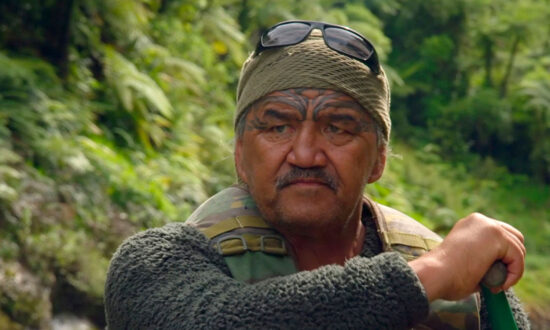Limbo, a moody police procedural, is something of a swansong in genre for writer and director Ivan Sen, who has helped pioneer an era of Australian screen noir that blends the toughness of the outback with the flair of a western.
His breakout 2013 film Mystery Road – starring Aaron Pedersen as Detective Jay Swan, the rough-around-the-edges Indigenous man who knows his community – was so popular it became a three-season ABC TV series, and also led to the 2016 spin-off film Goldstone, with Jacki Weaver. Last year came the 2022 prequel, Mystery Road: Origin, introducing the talented Mark Coles Smith as Jay Swan. Sen didn’t write it but he was executive producer.
“Personally, it [the police procedural] is not something that I am going to keep pursuing – it was kind of nice to do that but I think I will maybe let it go with this film and get back more into the straight drama world,” Sen says. “I think if you are talking procedurals and police in a rural area, there are limitations creatively that are put upon you.”
He goes out on a high artistic note with Limbo, a stylish, stand-alone character study and murder mystery about a jaded detective, Travis Hurley (Simon Baker), who arrives in the outback town of Limbo to investigate the cold-case murder of an Aboriginal woman 20 years earlier.
“I don’t know if Travis is a hero or anti-hero. That’s not really the point,” Sen says. “He’s a man looking for salvation and finds himself in a situation to do something about it.”
Sen, who is committed to telling Indigenous stories, has spent the past decade exploring outback noir on screen with great success. He and fellow Indigenous filmmaker Warwick Thornton (Sweet Country, Firebite) have made black cinema more mainstream, even though Sen never shies away from the tensions between black and white Australians in a country town.
“I’m from the country and I just write what I know pretty much, as well as being influenced by research and other people’s experiences,” he says. “But essentially Jay Swan, the Indigenous detective, has come from me. I was going to be a cop after high school and applied after Year 12 and I didn’t get in.”
Sen visited Coober Pedy some years ago and immediately decided to use it as a backdrop. He doesn’t write first and then find a place for a setting; he wrote Limbo with Coober Pedy in mind.
“Especially the underground living experience and the culture within it,” he says. “So it was something I had planned from the very beginning – and I actually called the film Limbo, which has this connection to the experience of being not far enough above ground to be heaven or far enough underground to be hell.”

A dramatic stage: Ivan Sen wrote Limbo with Coober Pedy in mind. Photo supplied
The film was shot in black and white partly for technical reasons – Sen is not a fan of digital colour – but primarily because Coober Pedy’s vast expanses of white ground provided a dramatic stage that gave images and characters a strong presence.
“There aren’t many places in Australia where you can shoot in black and white properly, with a full tonal range. But Coober Pedy is one of very few.”
He is not surprised by the international popularity of Coober Pedy as a location, or that a team of United States celebrities – including disgraced cyclist Lance Armstrong and Bruce Willis’s daughter, Tallulah – are currently there filming the reality show Stars on Mars, with Star Trek’s William Shatner as their host.
“There have been a lot of productions out there that have used the moonscape and the desert,” Sen says. “It’s big enough [to host film productions] and people stick to themselves a lot. We had no problems other than the weather; it was very windy.”
His portrayal of the uneasy tolerance between black and white people, and their mutual acknowledgement of their different lives, comes directly from experience, and he remembers watching similar interactions as he was growing up.
“Most [of the interactions] are pretty casual, except there is a history there. There is a field there and they negotiate their interactions on that field.”
Limbo is a stark thriller that unfolds without flourish, and Sen is more satisfied with it than anything else he has done. He likes the dramatic aesthetic, and also valued working with Baker, a committed Australian actor who has a high profile overseas from films like The Devil Wears Prada, with Meryl Streep, but who chooses independent Australian works like this one, in which he wears an unflattering buzzcut.
Sen wrote the anti-hero cop for Baker and moulded the script so that it suited the actor’s approach to the role. The pair collaborated, and Baker was keen to support a project telling an Indigenous story.
“Simon is such an untapped talent and I just really wanted to allow Simon to have some space to just act, play this character, this strange, old-man cop,” Sen says. “We made a really good team and we may go on and do other stuff together, I think.”

Simon Baker and Natasha Wanganeen in Limbo. Photo supplied
The film’s relative slowness, undisturbed by the frenzied interruptions typical of a US police procedural, comes from Sen’s willingness to allow events to unfold naturally, so the audience watches a character move through a scene in almost real time. He wanted “to let the continuum of time and space flow” – something he had not tried before and which requires putting an element of trust in the audience.
“I wanted, as a director, to not get in the way of that. Just letting the dramatic moment carry for as long as possible, without the contrivance of editing or cutting to another shot.”
Sen cast South Australian actor Natasha Wanganeen in a prominent role as a key member of the Aboriginal family of the murdered woman who were treated at best with cursory indifference, and at worst as criminals themselves. He says he has personal insight into the unrelenting trauma this kind of treatment causes Indigenous families, and wanted to show audiences that a crime that was 20 years old was never a cold case for the family.
Wanganeen’s powerful screen presence has won her television and film roles, and in 2021 she had a guest part in Thornton’s 2021 TV zombie apocalypse series Firebite, which was also filmed at Coober Pedy. She says the town has a special place in her heart, and is unlike anything she had seen before.

Get InReview in your inbox – free each Saturday. Local arts and culture – covered.
Thanks for signing up to the InReview newsletter.
“It’s a tough place with tough people but their hearts are as big and beautiful as the opals they find there,” she says.
Wanganeen found working with Sen to be an amazing and special experience, and says his calm nature spread to all those who worked with him.
“He is a director who lets you drive your character from your own raw experiences, which is what every actor wants and needs. He is a master, and it was an absolute pleasure to work with him and to be part of Ivan Sen’s black magic.”
Limbo opens nationally in cinemas on May 18. Palace Nova Eastend in Adelaide is presenting a special preview screening on May 15 featuring a live, in-person introduction by Ivan Sen, Simon Baker and Natasha Wanganeen.
Support local arts journalism
Your support will help us continue the important work of InReview in publishing free professional journalism that celebrates, interrogates and amplifies arts and culture in South Australia.
Donate Here




